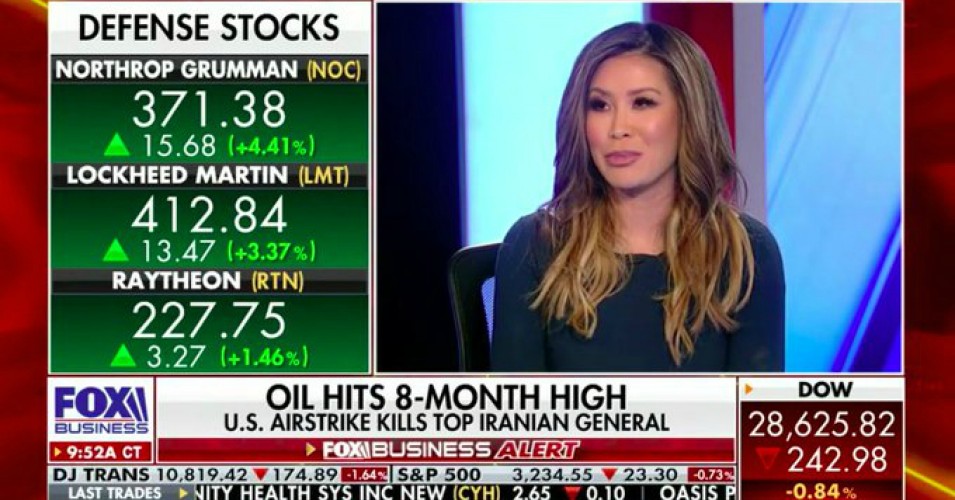
Support justice-driven, accurate and transparent news — make a quick donation to Truthout today!
Almost immediately after the United States assassinated Iranian General Qassim Suleimani in a drone strike Thursday night, major American weapons manufacturers and defense contractors—from Northrop Grumman to Lockheed Martin to Raytheon—saw their stocks surge as investors sensed the growing likelihood of another costly and deadly war in the Middle East.
As the Los Angeles Times reported, “Even as the broader Standard and Poor’s 500 index lost ground, the S&P Aerospace & Defense Select Industry index climbed 1.8% on Friday.”
According to the Times:
Northrop Grumman Corp. stock jumped 5.4%. Based in Falls Church, Va., Northrop Grumman makes such aircraft as the B-2 bomber and the upcoming B-21 bomber and is the sole bidder to build the next generation of intercontinental ballistic missiles.
AeroVironment Inc. advanced 6.9%. The Simi Valley company makes small, short-range reconnaissance drones that U.S. soldiers use. The increase in troop deployment to the Middle East could mean more business for AeroVironment, said Ken Herbert, managing director with investment banking and financial services firm Canaccord Genuity.
Shares of Lockheed Martin Corp., which makes the F-35 fighter jet, climbed 3.6%. Missile and radar technologies maker Raytheon Co.’s stock rose 1.5%.
The surge in defense stocks was readily highlighted on corporate television programs like Fox Business and in publications like Investor’s Business Daily, which noted that “Northrop Grumman (NOC) and Lockheed Martin (LMT) were big winners in Friday’s stock market trading, along with Raytheon stock.”
Citigroup analyst Jonathan Raviv wrote Friday that “if Middle East conflict were to ratchet up…we think it could be tougher for Democratic Party electoral candidates to argue against a stronger defense budget in 2020.”
“As is always the unfortunate case, defense stocks tend to benefit from perceptions of heightened risk and the potential for geopolitical conflict,” Raviv added.
hi hi just your daily reminder that our country is in a military-industrial stranglehold and everyone trying to sell you war this morning is a key player https://t.co/e20DAbNbev
— savannah wooten (she/her) (@SavannahEWooten) January 3, 2020
Rep. Ro Khanna (D-Calif.), who along with Sen. Bernie Sanders (I-Vt.) unveiled legislation to stop Pentagon funding for U.S. military action against Iran, tweeted late Friday that “if you are wondering who benefits from endless wars, take a look at how stocks for weapons manufacturers began to rise as soon as Suleimani was killed.”
“Defense contractors spent $84 million lobbying Congress last year,” Khanna noted, “and it certainly wasn’t to promote diplomacy and restraint.”
Media that fights fascism
Truthout is funded almost entirely by readers — that’s why we can speak truth to power and cut against the mainstream narrative. But independent journalists at Truthout face mounting political repression under Trump.
We rely on your support to survive McCarthyist censorship. Please make a tax-deductible one-time or monthly donation.